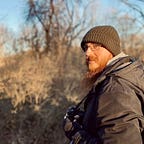The Ecological Cost of Nihilism, or a World Disenchanted
“I for one see the disasters wrought by man to be far more cruel than those that nature brings us. But however clever we may be at increasing our wretchedness through our institutions, we have till today not succeeded in perfecting ourselves so far that life in general has become a burden for us and we choose nothingness over being.” -Rousseau
Jean Jacques-Rousseau wrote this passage in a letter to Voltaire as a reaction to the Lisbon earthquake of 1755, and in it is a foreshadowing of a growingly nihilistic society he sees around him as a reaction to enlightenment and a result of a growing sense of meaninglessness in everyday life. What I find so striking about this passage, is Rousseau is describing and foreshadowing nihilism decades before the term would enter common philosophical parlance with Jacobi first in 1799, but more significantly Nietzsche a century later. (We’ll get to him.) Further, Rousseau sees an inherent relationship between wretchedness and nothingness. He offers a prognosis, a warning even, of what will happen in the case of meaninglessness and nihilism prevailing.
